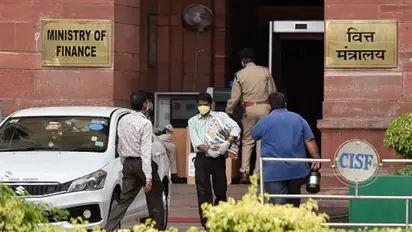Interim Budget 2024: CII wishlist includes simplifying tax payment processes, revising Capital Gains structure

Synopsis
Interim Budget 2024: The CII proposals cover various aspects, including simplifying personal tax payment processes, extending the time limit for filing revised returns, and revising the Capital Gains structure.
In anticipation of the Union Budget announcement scheduled for February 1, the Confederation of Indian Industry (CII) has put forth a series of recommendations to the Finance Ministry, encompassing a spectrum of fiscal measures from simplifying tax payment processes to proposing revisions in the Capital Gains structure. A primary focus of the CII's suggestions is the streamlining of personal tax payment procedures. The industry body emphasizes the importance of tax certainty and calls for measures to enhance the overall ease of fulfilling tax obligations. This recommendation aligns with the broader objective of making the taxation process more accessible and user-friendly.
Interim Budget Live Updates: Finance Minister Nirmala Sitharaman to present Budget 2024
In addition, the CII has urged the Finance Ministry to reconsider the time limit for filing revised tax returns, advocating for an extension at least until the conclusion of the Annual Year. This extension is seen as crucial to enabling taxpayers to efficiently claim or modify foreign tax credits. The CII underscores the necessity for this extension, aligning it with the recently extended deadline for submitting Form 67.
The CII's proposals also extend to the realm of Capital Gains taxation. The industry body suggests a simplified structure wherein short-term capital gains arising from the sale of financial assets are taxed at 15%, while long-term gains incur a 10% tax rate. This recommendation is not limited to financial assets, as the CII suggests applying the same tax rates to other assets, with a specified minimum holding period of 12 months for assets classified as long-term.
For immovable assets, the CII recommends a 20% Long Term Capital Gains tax, coupled with the benefits of indexation. This nuanced approach reflects the industry body's recognition of the varying nature of assets and their tax implications.
Furthermore, the CII advocates for the exemption of buy-back tax in the case of listed shares, particularly when the buy-back process is executed through the open market using the stock exchange method. Currently, companies are subject to a 20% 'Buyback Tax' on shares repurchased. This recommendation finds support from the Federation of Indian Chambers of Commerce & Industry, aligning both industry bodies in their stance regarding share buybacks.
These comprehensive recommendations from the CII illustrate a holistic approach towards fostering a more taxpayer-friendly environment and optimizing the fiscal landscape to stimulate economic growth. The proposed changes in personal tax payment processes and Capital Gains taxation reflect the industry's collaborative effort to contribute valuable insights for the forthcoming budgetary considerations.
Stay updated with all the latest Business News, including market trends, Share Market News, stock updates, taxation, IPOs, banking, finance, real estate, savings, and investments. Track daily Gold Price changes, updates on DA Hike, and the latest developments on the 8th Pay Commission. Get in-depth analysis, expert opinions, and real-time updates to make informed financial decisions. Download the Asianet News Official App from the Android Play Store and iPhone App Store to stay ahead in business.